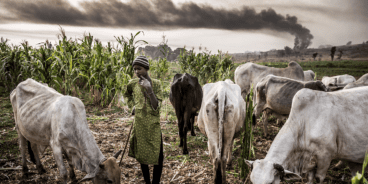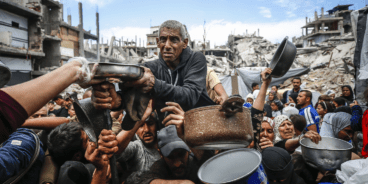Statement on the Upcoming Election and Mass Atrocities in Cameroon
As Cameroon prepares for its 7 October presidential elections, armed conflict and identity-based violence continue to escalate in the North-West and South-West regions where security forces are committing potential crimes against humanity. Over the last year at least 400 people have been killed and numerous villages have been burned down. More than 246,000 people are displaced in the South-West region alone. As Cameroonians prepare to vote it is essential that the government, the African Union (AU) and the broader international community uphold their responsibility to protect and halt Cameroon’s deadly slide towards civil war.
Since late 2016 English-speaking activists in Cameroon’s North-West and South-West regions have been protesting their alleged marginalization and neglect by the Francophone-dominated government. During October 2017 Anglophone separatists declared the independent state of “Ambazonia,” resulting in a rapidly escalating armed conflict between government security forces and separatist groups.
As the government confronts the separatist rebellion, there is growing evidence that its security forces are committing systematic and widespread attacks on civilians, amounting to possible crimes against humanity. Various civil society organizations have documented extrajudicial killings, torture, and the burning of homes and property in Anglophone villages. These allegations have been bolstered by the recent circulation of videos depicting members of the Cameroonian security forces summarily executing unarmed civilians during the government’s battle against the extremist group Boko Haram.
Armed Anglophone separatist groups have also perpetrated human rights abuses, including attacks on schools, targeted killings of government officials, the kidnapping of teachers and extortion. More than 160 members of the security forces have been killed in armed separatist attacks.
The targeting of individuals based upon their language group, cultural identity and perceived political allegiances poses a threat to all Cameroonians. In particular, the pattern of systematic violence by the security forces bodes ill for the upcoming elections, during which President Paul Biya will run for a seventh term. Given the current unrest in the Anglophone regions, it is difficult to see how free, fair and transparent elections will be able to take place.
Despite these warning signs, it is still not too late for the government – working with the AU and other international partners – to de-escalate the conflict. In keeping with the recent suggestion of various Cameroonian religious leaders, the government should immediately initiate a dialogue with Anglophone community leaders to address legitimate grievances and ameliorate the root causes of the conflict. The government should also initiate socio-economic programs and political reforms that tackle corruption, poor governance, as well as improved access to employment and educational opportunities in the North-West and South-West regions.
The AU and UN Security Council should also impress upon the government that its security forces must consistently adhere to international humanitarian and human rights law. The government of Cameroon should grant the Office of the High Commissioner for Human Rights unhindered access to the Anglophone region to investigate all alleged human rights violations and abuses. Any identified perpetrators of potential mass atrocity crimes must be held accountable for their actions, regardless of position or affiliation.
Read Next
Related Publications

Atrocity Alert No. 444: Nigeria, Haiti and South Sudan

Atrocity Alert No. 437: Israel and the Occupied Palestinian Territory, Ukraine and Nigeria
